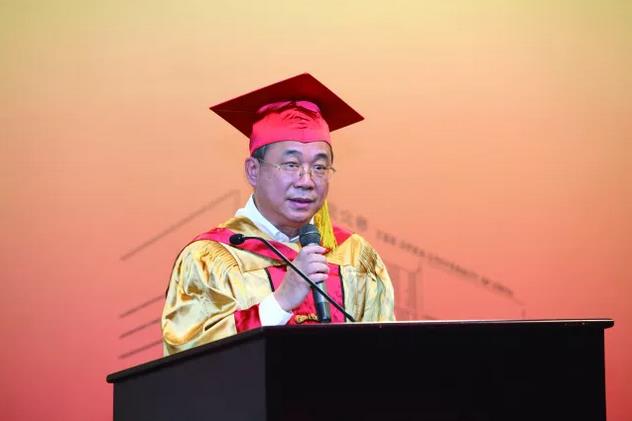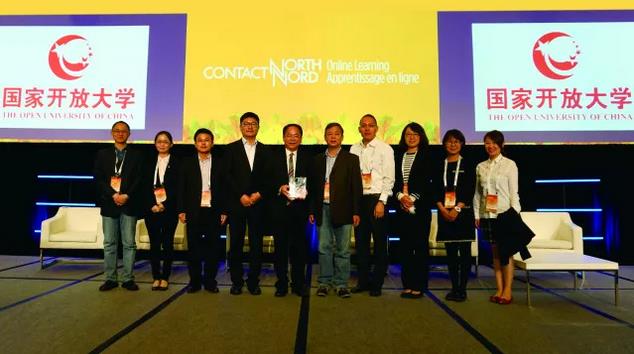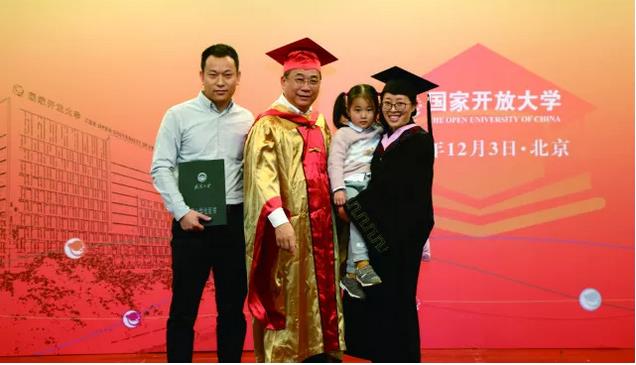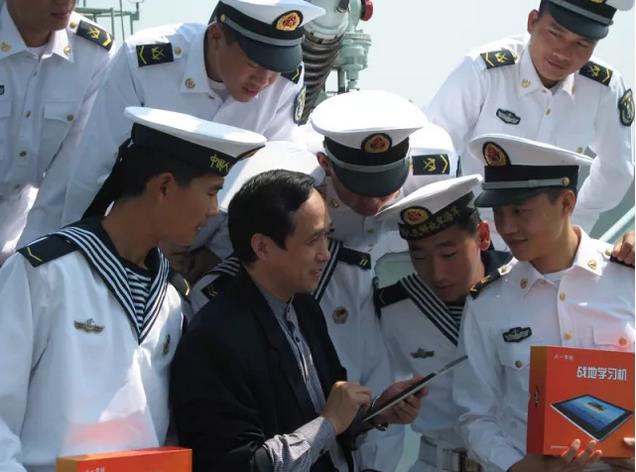 19 Oct. 19th, 2017. Toronto, Canada. At the 2017 International Council of Open and Distance Education (ICDE), the general secretary of the ICDE, Gard Titlestad, presented the ICDE Institutional Award of Excellence to OUC president Yang Zhijian.
19 Oct. 19th, 2017. Toronto, Canada. At the 2017 International Council of Open and Distance Education (ICDE), the general secretary of the ICDE, Gard Titlestad, presented the ICDE Institutional Award of Excellence to OUC president Yang Zhijian.

In presenting the award, he declared that "the OUC is being awarded the Institutional Prize of Excellence for its outstanding achievements in promoting equality of educational opportunity, teaching quality, reform and innovation in both education and learner-development models, in-depth integration of information technology into education, construction of a "credit bank" that realises accreditation through the accumulation and transfer of credits, and the creation of a uniquely Chinese form of development recognised and supported by both the government and people of China."
The conference room resounded with applause. The ICDE Institutional Prize of Excellence is given to institutions that have made significant contributions to international open and distance education in recent years, and is said to be one of the most important prizes in modern open and distance education. Each year, only one educational institution has the honour of winning this award. Only five years have passed since the OUC was created out of the former China Central Radio & TV University (CCRTVU), and this award honors its years of effort in promoting lifelong education nation-wide, equality of educational opportunity, and the development of the use of alinformation technology in education. As he held the prize, Yang Zhijian was overwhelmed with emotion. Having been engaged in the cause of education for over three decades, he is very familiar with what it entails. He has been president of the OUC (formerly CCRTVU) for seven years, and will continue to make efforts to realise his dream of promoting equal opportunity, sharing educational resources, and improving the system of lifelong education, leading the OUC forward through his passion and sense of responsibility.
Ready to begin from a new starting point
With its enrolment having reached 1.06 million, and total number of registered students at 3.6 million, the OUC witnessed its second-highest number of enrolled and registered students in 2017, which happened to be the 5th anniversary of its founding. At this critical point of its history, a multitude of feelings overcame him, and he thought of how "over the past five years, our road has been full of difficulties and challenges, but with a clear destination."
In July of 2010, Yang Zhijian was transferred from the Higher Education Division of the MOE, of which he was then deputy director, to the position of president of CCRTVU. At that time, his priority was to promote the reform and transformation of radio and TV universities and do the preparatory work for founding the OUC. In October of that year, the State Council launched a project for exploring the construction of an Open University Construction Model, and named the CCRTVU as the pilot unit. Since then, Yang Zhijian, who has 30 years of experience working in higher education, has been tightly connected to the preparation and founding of the OUC, as well as China's distance education as a whole.
He has stated: "We can say that it is the times that make our mission change." Founded in 1979, the CCRTVU was approved by Deng Xiaoping to cater to the strong demand for education suppressed by the preceding ten years of turmoil, and the huge demand for talent necessitated by the under-development of various industries in various fields. Along with the development of ordinary higher education, the increasingly diverse public demand for education, and the increasing need for education of the labour force, there was also a growing demand for non-degree education. The concept of lifelong learning was becoming a reality, and changes in both supply and demand made the transformation of the CCRTV urgent.
By holding conferences attended by experts, seeking written suggestions, carrying out personal interviews, comparing and studying relevant investigative papers, and above all listening to the advice of experts and scholars from government departments at all levels both at home and abroad, as well as RTVU leaders and teaching staff on carrying out the pilot project, Yang Zhijian led his team in putting forward the OUC Construction Plan. "We faced great pressure at that time, but were humbly open to suggestions, and did not give in to the pressure while striving to accomplish our goals."
On 21st June , 2012, with the approval of the MOE, the OUC was created from the former CCRTVU, and its founding ceremony was held in the Great Hall of the People on 31st July. The ceremony was intense and solemn. Then member of the Political Bureau of the CPC Central Committee and State Councilor Liu Yandong inaugurated the OUC and delivered a speech, stating that "the OUC should take modern information technology as its support, integrate and share the best educational resources, introduce teaching innovations, ensure that the Open University has Chinese characteristics, provide members with flexible, convenient, fair and open learning methods as well as multi-level and diverse educational services, make positive contributions to building a society in which lifelong learning is the norm - a powerful nation in terms of education and human resources." The warm scene at the founding ceremony still lingering in his mind, Yang Zhijian was inspired to say: "I was excited! It was a big event, a landmark in the transformation of the OUC. Our efforts had not been in vain, and we were finally affirmed and recognised by the CPC Central Committee and the MOE."
A new journey starts at this time
Though the OUC had been founded, it was not easy to explore its construction model through the pilot project. The OUC was facing a double challenge. Yang Zhijian said, "We not only had to renovate an old building, but also create a new one, and the new building had to be built within the old one.” On the one hand, the OUC had the task of emancipating its thinking, undertaking reforms and innovations, and pushing forward the pilot project based on the requirements of the OUC Construction Plan, while on the other hand it was not a brand-new university, but based on the already existing school system of the CCRTVU. At that time the school had nearly three million students, so we needed to ensure the normal operation of the system, including continuity in the teaching. Therefore, the OUC adhered to a step-by-step plan, attending to the continuity of the system and the pilot project at the same time.
"Our original intention was to promote lifelong learning nationwide, use modern information technology as a support, promote equal access to education, and run a university that aims to serve the public and is part of society," Yang Zhijian said. In the OUC Construction Plan, it was clearly stated that the OUC takes the promotion of lifelong learning and of a society based on this as its mission, stressing the concepts of "openness, quality, responsibility, diversity, and internationalisation," offering both degree and non-degree continuing education while constantly meeting the demands of the public for diversified and personalized education. The goal was to build the OUC into a new type of university within China's system of higher education, a high-level open university with Chinese characteristics, and an important pillar in the construction of a society in which everyone has access to education. The school motto was revised to state: "Make learning benefit all, provide education for all people with no distinctions."
About the difficulties of the process, Yang Zhijian said only a few words. He emphasised the working principle of "targeting the long term, focusing on reality, and moving forward in a steady and orderly way." In 2016, facing various contradictions and challenges to the OUC pilot programme relating to “renovation of the old building,” “construction of the new building,” and “building a new building within the old building,” the OUC issued the OUC Comprehensive Reform Plan to locate and address the key points and difficulties.
Having maintained steady progress over its first five years, the OUC has now reached a new starting point. Looking back on those years, Yang Zhijian said with emotion, "Over the past five years, we have made great achievements and have stepped onto a new stage. For example, through its strategic transformation, the OUC has clarified its orientation and mission, leading the whole RTVU system to promote academic continuing education and play a strong role in boosting the development of non-academic continuing education. We have dealt with many problems, and built an "OUC community." A new type of university has taken shape, and the OUC has conducted normal operations while also developing rapidly. However, numerous deep problems and contradictions have emerged during the process, and while superficial problems have been resolved, the remaining ones require our continued attention. We are deeply aware that the construction of the OUC is a long-term process. The homophone for "1314 project" is "lifelong project," so we must stay focused on reform and construction in our key goals and key areas. Only this will lead to the ultimate success of the OUC."
 In October of 2017, the OUC was awarded the ICDE Institutional Prize of Excellence. Yang Zhijian (middle) accepted the prize.
In October of 2017, the OUC was awarded the ICDE Institutional Prize of Excellence. Yang Zhijian (middle) accepted the prize.
Strive to explore a new model of continuing education
In October of 2017, a "Five Years On" achievement exhibition was held in the Beijing Exhibition Hall. The exhibition comprehensively and vividly illustrated the historical reforms of the CPC and national cause since the 18th CPC National Congress. In the 10 exhibition zones, the OUC appeared nearly 10 times. Those young farmers holding their OUC graduation certificates, military officers studying in front of their PCs, migrant workers making use of their spare time to take "five-minute courses" on their mobile phones, gave every visitor a feeling of warmth.
The following is a summary of the achievements of the OUC since its founding five years ago. It has focused on the "1314 Project" based on the blueprint drawn up in the OUC Construction Plan to achieve phased results in terms of its mission, degree and non-degree continuing education, the use of information technology in education, the construction of a "Credit Bank," research into the theory of distance open education, and the global promotion of Chinese language and culture. It aims to share education resources with the grassroots in the countryside and on frontier islands, and give people who want education, but have few resources, opportunities to receive it.
"The OUC is a university that involves the cooperation of all RTVUs and open universities. At present, its registered students number 3.6 million, 70% of whom are from the grassroots, and 55% distributed in the middle and western regions of China. 200,000 are farmers, 120,000 military officers, 270,000 are from minority ethnicities, and over 6,000 are disabled. Their ages range from 18 to 80. If such students do not have the chance to receive an education, where is the fairness in our society?" Yang Zhijian showed his feeling of pride through these words.
Born in 1959 in Guangxi Province, Yang Zhijian was sent to the countryside as an educated youth for two years after senior high school, and then worked as a mechanic for two years. In 1979, he was admitted to the Philosophy department of Wuhan University for his excellent performance, and after graduation was assigned to work for the MOE in the micro-management of higher education. His four years of experience living among ordinary people had given him a horror of the loss of educational opportunity, and his three decades of working for the MOE made him deeply aware of China's educational situation. "I think two types of university are great. On the one hand there are prestigious universities like Peking University and Tsinghua University, which have cultivated many of the elite of our country, and whose graduates have taken important positions in a variety of fields and industries. But on the other hand there is our type of university, which provides for equal opportunity, improvement in the quality of the nation as a whole, and growth in the overall sense of progress and happiness."
In April of 2017, he led a delegation to Ganzhou, Jiangxi Province, where the OUC "Long March Belt" educational projects targeting poverty had been launched. Shangyou County had been chosen as the location of a pilot to explore the capacity of education to alleviate poverty by intensifying the construction of study centres, improving the operations of schools, and the effectiveness of both degree and non-degree education. In July, he visited another pilot of this project in Qinglong County, Hebei Province, to investigate the situation there. "The region targeted for poverty alleviation through this project must meet two conditions: first, it must have been an area through which the Red Army passed during the Long March; and second, it must be a county that currently receives national poverty-alleviation aid. The main method is to offer free training to grassroots cadres in the countryside of the targeted regions, providing free education, including vocational-skills training, to the poor there." Currently 26 lower-income counties and cities, such as Ruijin and Shangyou in Jiangxi Province and Yongshun in Hunan Province, have been included in this initiative.
In the 19th CPC National Congress, a focus on combining poverty alleviation with the promotion of ambition and wisdom was proposed. According to him, the OUC has had this focus for several decades. Since 2004, it has been implementing the "One-College-Student Per Village” programme based on the requirements of the MOE. Over the past decades, this programme has cultivated many village cadres dedicated exclusively to grassroots management. "We have set up courses in areas such as planting, breeding, management and service." The village secretary of Guchong Village, in a remote mountainous region in the southern part of the Zhijiang Dong Minority Autonomous Region in Hunan Province, Long Siqing was a beneficiary of the programme, and a graduate of the OUC with a degree in Rural Administrative Management. In recent years, she has led the local villagers out of poverty, and their oranges have been ranked among the "top 10 national agricultural products" by the Ministry of Agriculture, gaining market position in cities around the country. Yang Zhijian stated with excitement that "as of the autumn of 2016, enrolment in the programme has exceeded 570,000, with over 380,000 graduates. It has cultivated a batch of new type of well-trained farmers who are willing to stay in the rural areas and achieve excellent results there."
Over the last five years, the OUC has further confirmed its goal of training citizens through degree continuing education, formulated the "OUC Quality Standard 1.0," promoted web-based education through its "Integration of Six Networks" plan as well as teaching reforms that have covered content, course systems, and methodology. The OUC has paid special attention to the demands of specific disadvantaged groups, such as those living in remote or ethnic-minority regions, and has intensified its development of non-degree continuing education, striving to explore new ways of undertaking it that are specific to the OUC.
 Yang Zhijian with two OUC graduates and their child
Yang Zhijian with two OUC graduates and their child
In terms of making use of information technology, the OUC has established a model for open distance education called "cloud, path, and terminal" to explore and develop a distance-education cloud platform that integrates teaching, learning, management, research and service. 314 cloud classrooms have been set up in western and middle regions of the country, with study centers in Xinjiang, Inner Mongolia and Gansu. It has also developed the OUC "O Learning Pad" mobile-learning terminal through a pilot involving 19,000 farmer-students in Hunan Province.
It is now possible to watch a five-minute micro-lecture on the OUC website or official OUC app. It is a lecture form that covers a single point in five minutes. Currently, 30,000 courses are available for free. Yang Zhijian said with delight, "Before 2011, it was unimaginable to use a mobile phone for learning. But now, mobile phones are not only considered tools for communication; they have become parts of our lives. Through its "Internet Plus" approach, the OUC has studied the learning characteristics of people in the internet era, and designed the main courses of all majors in terms of approaches to independent study, tutoring, process, and test evaluation around these characteristics. The five-minute micro-lecture is the first of its kind in China, and cannot be surpassed. Through improvements in the technology it has reached the highest level of quality, and though producing it takes a great deal of work, it has been well received. This makes me proud."
However, Yang Zhijian was not yet content. He launched the five-minute micro-lecture for a course called Thought and Politics, which created a larger video using historical video clips, allowing students to gain credits easily by watching the video. Thanks to this they could learn with almost no effort.
The credit bank is another product that came about through the leadership of Yang Zhijian. It adapts the operations of a bank to a new purpose, introduces the concept of open education, and is called the "lifelong learning bridge." To build this bridge, Yang Zhijian strove to promote cooperation among universities. Relying on its advantages in teaching resources and areas of study, the OUC also set up alliances with multiple industry associations, large enterprises, and major cities, and now has 70 learning-outcome accreditation sub-centres nationwide. The OUC has developed and launched a credit-bank management platform using information technology, and connected with the Ministry of Public Security's "citizen-network identification system," the Ministry of Human Resources and Social Security's "national qualification-certificate national online-query system," and the MOE's "China higher-education student-information system." This means that, wherever a student studies, his or her results are valid anywhere as long as they are registered with the credit bank.
Seizing opportunities, deepening the reforms, making bold innovations, and being courageous in practice, the OUC put forward a "Chinese model" of the construction of open universities. It has formed a preliminary open-school organisation model called "OUC community," in which the group runs the school as a cooperative with diverse participants. It has also formed a preliminary model for integrating modern information technology with distance and open education, and one for learner development called "Integration of Six Networks," which aims to guarantee and enhance the quality of learner development. On top of that, there is the preliminary "credit bank" model that promotes the accreditation, accumulation, and transfer of formal and informal learning outcomes, and a model of non-degree education that caters to the national demand for diverse and personalised lifelong learning. In Yang Zhijian's opinion, "the fine education resources of our country are not distributed in a balanced manner, and are not easily accessible. Putting together resources on a platform and making it easy for users to gain access to them was a problem that badly needed to be addressed. The first breakthrough for us was collection; that is, collecting the course resources to build a digital-learning resource center. There are nearly 30,000 courses available in this centre. We are proud that over 200 study centres, as well as vocational colleges and social institutions nationwide, can realise sharing through the co-construction and promotion of the platform."
 Military officers making use of a battleground terminal for distance learning.
Military officers making use of a battleground terminal for distance learning.
Prosperous future of distance education
"Improve the student-subsidy system, allowing a majority of the new urban and rural labour force to receive senior high-school education, and even higher education." "Run continuing education well, accelerate the building of a society of continuous learning, and strongly improve the quality of education nationwide." In the report of the 19th CPC National Congress, Secretary Xi Jinping put forward requirements related to all of these.
According to Yang Zhijian, these requirements are like personal instructions to him and the OUC. “Secretary Xi Jinping clearly pointed out in the report of the 19th National Congress of CPC that, since socialism with Chinese characteristics has entered a new era, the principal contradiction facing Chinese society has changed. What we now face is the contradiction between unbalanced and inadequate development and the ever-growing need people have for a better life. This is true of the OUC. We know we can provide education, but need to think about whether it matches what people need. We need to satisfy three parties: the learners themselves, their employers, and school organisations. We cannot be only content with our own satisfaction." In the report of the 19th CPC National Congress, secretary Xi Jinping pointed out that education must satisfy the people, and that the core is to foster virtue. "In higher education, we have shifted our orientation from scale to quality and efficiency." According to Yang Zhijian, the 19th CPC National Congress has further clarified the direction the OUC should take, and is bound to lead the OUC to a new level of achievement.
Though great achievements have been made, Yang Zhijian still forecasts future challenges. "In the field of distance education the competition has been growing, and so to fail to make progress at this point is to be left behind."
Five years of hard work have yielded fruitful results. Climbing mountain after mountain, Yang Zhijian and the leadership of the OUC have led an increasingly mature OUC team to greater and greater heights. In distance and continuing education, which have a long history but still numerous uncertainties, he has made innovations and moved forward in promoting equality of educational opportunity and establishing a university for the people.
Standing at a new starting point, Yang Zhijian said, "One of the essences of distance open education is to collect the best resources, provide learning opportunities, promote equal opportunity, and improve teaching quality and school efficiency. Today, under the guidance of national "Internet Plus" strategy, distance open education is playing an important role in lifelong education, and with the integration of information technology is exploring models of education outside of the traditional campus-based model. We should leverage information technology to promote bringing top-quality educational resources to the countryside, disadvantaged schools, poverty-stricken areas, and group with difficulties, making everyone enjoy a fair and fine quality of education."
Author: Hua Nan, China Profiles Photographer: Yu Zhangli